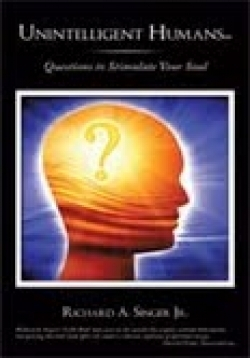Unintelligent Humans
Questions to Stimulate Your Soul
Unintelligent Humans: Questions to Stimulate Your Soul, by Richard Singer, Jr., a psychotherapist, is a small book containing barely fifty-six pages, the first twenty-one of which collect short questions and drawings designed to stimulate further thought and discussion. The second part of the book consists of a series of short essays on topics such as “Who Is Your Soul Mate?” “What Is Truth?” and “How Important Are Children?” Interspersed throughout the work are boxed quotes denominated as “Ageless Wisdom” from a variety of sources ranging from Gandhi to Zen proverbs. The book concludes with a brief interview with Richard Singer, Jr., giving the reader a backdoor glimpse at the author’s thought processes and experiences.
The book’s title is somewhat misleading in that the author merely raises the question of whether human beings, on a regular basis, apply the intelligence and wisdom available to them. He does not actually reach a conclusion on this point, but leaves that up to the reader. In fact, during the course of the entire book, Singer raises more questions than he answers. He offers the wisdom of many who have preceded him and truths that he has arrived at, yet he admonishes the reader not to accept everything he says, but to question and probe deeper: “You must test this wisdom yourself, consistently heeding the words of Buddha, ‘Believe nothing merely because you have been told it.’”
Singer defines himself, partly, as a “seeker of truth.” In the interview he briefly describes his early life, education, and struggles with a cocaine problem. Given his background and experience, it is clear that Singer has worked hard to gain the clarity and insights he shares in this book.
Unintelligent Humans, although small, is not an insignificant book. Singer has done well in choosing the quoted wisdom he offers. They are designed to encourage thought and further inquiry. These quotes serve as a guide to someone not deeply schooled in Eastern philosophy or spirituality as a beginning point for further reading. To a reader who has some experience in the subject this book would offer a few minutes departure from the day-to-day world and a reminder of past lessons. It is the sort of book one can read in a sitting and return to it again and discover something new.
Reviewed by
John Michael Senger
Disclosure: This article is not an endorsement, but a review. The publisher of this book provided free copies of the book and paid a small fee to have their book reviewed by a professional reviewer. Foreword Reviews and Clarion Reviews make no guarantee that the publisher will receive a positive review. Foreword Magazine, Inc. is disclosing this in accordance with the Federal Trade Commission’s 16 CFR, Part 255.

